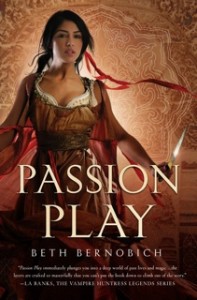Sometimes it seems as if Fantasy and Historical Fiction each exist in their own little corner of the literary universe, each side snarling at the other for perceived pedantry or lack of intellectual rigor. Relatively few authors dare to blend the two genres, which has always been surprising to me considering some of the oldest works of western civilization were a mixture of fact and fancy.
Today I’m pleased to introduce you to a kindred spirit, Beth Bernobich, who has made a splash with her debut novel, PASSION PLAY. I asked Beth what prompted her to blend these two genres and here is her fascinating story:
THE MAGIC OF HISTORY
by Beth Bernobich

A number of people have asked me why I write historical fantasy and not historical fiction set in the real past. Or even stories set in today’s world. I had to think about that for a while. Was I cheating by making up a past, instead of researching the real history? After all, everyone knows that “fantasy writers just make everything up.”
(To be accurate, all writers “make everything up,” but you know what I mean.)
So the first question: why history?
Years ago, I took a college class where our goal was to recreate the years leading up to the American Revolution. The professor assigned us each a character to play—some were genuine historical figures, like Samuel Adams or King George III, some were characters representative of the times. The professor himself took the role of Omnipotent Being and whatever other minor roles were needed. The class spent a month researching the people and the times, and more specifically, their own characters. The last two weeks of the class, we met in separate classrooms—British and Colonialists—to play out the next ten years. Talking, yes, but also sending letters back and forth, arguing for loyalty, or not, and once staging a protest to the Royal Governor. While we were required to act true to the times and the people involved, we were not restricted to what actually happened. In fact, our professor started things off by changing the outcome of the French and Indian War.
It was like collaborating on a story in real-time—a story set in history, but one with enough details altered that we had the potential to create something new.
(And we did try to change history. We Colonialists did our best to avoid a revolution. Alas, in spite of our best efforts, we ended up having one two years early.)
At the end of the month, the Colonialists and British met in the college’s executive boardroom to talk about the class. Except we weren’t talking, we were on our feet yelling at each other, furious about perceived wrongs, imperialist oppression, troublesome colonialists, and more. The professor sat at the head of the table, grinning his Omnipotent Being grin. When we were finally quiet, he said, “Now you understand why the revolution happened.”
From that moment on, I was hooked.
History isn’t about dry lists of battles or politicians. History, as the class showed me, is about why things happened. To understand that, you need to know the interconnections between culture and war, between technology and medicine, between all the facets that make up our lives. You need to know about the people in their time, and you especially need to know what passions they held.
And if you understand what happened then, you can better understand what’s going on today.
So why historical fantasy?
It goes back to that history class. I loved how we altered bits of history to create something new. I loved how we could use rigorous research right along with our imaginations. Then I discovered there was fiction just like that class, and that was magic times a hundred. So I started writing all kinds of fantasy that blended with history. Sometimes I’d build the new history into secret corners of the real world. My story “Air and Angels” takes place in Edwardian England, but with aliens. Or it’s our world, but with an alternate history line, such as my story “The Golden Octopus,” where Ireland is the powerful empire, and England one of its dependencies.
 But sometimes, I need to write the history myself. In my series from Tor Books, which starts with the novel Passion Play, I wanted to weave in the themes of fate vs. free will, of second chances, and the echo of actions throughout centuries. So I decided to create my own world, with its own history, and with characters who had lived through multiple lifetimes.
But sometimes, I need to write the history myself. In my series from Tor Books, which starts with the novel Passion Play, I wanted to weave in the themes of fate vs. free will, of second chances, and the echo of actions throughout centuries. So I decided to create my own world, with its own history, and with characters who had lived through multiple lifetimes.
When Passion Play starts, it starts small and intimate—focusing on the main character and her personal desires. As the book goes on, she learns more about the world around her, sometimes in horrifying ways, but she also learns hints about her previous lives. In the sequel, Queen’s Hunt, she learns many more details of her past lives, and how that past helped shape the world of the present. In the final book of the trilogy, Allegiance, it’s time for her to create some new history of her own.
(Note: If you’d like to get a flavor of the novels, my story “River of Souls” on Tor.com is set in the same world as Passion Play, but set four hundred years earlier. It centers around Ilse’s favorite poet, Tanja Duhr.)


Hi Beth!
Thank you for sharing your views with us. I have always loved historical fiction but it’s a rare thing to get a peek into the motivations of writers. Do you think that your passion for history allows you to create more realistic worlds when you are writing pure fiction? Also, have you ever worried about stepping “too far” out of the bounds of history? I know that I would worry about maligning the characters that I represented, or violating some kind of “truth” with my narrative. How do you avoid that kind of problem?
Yes, I think knowing history helps the fantasy writer create more realistic worlds. Reading about our own past helps us to see how economics, politics, technology, culture, and all the rest of those seemingly disparate elements connect.
As for “stepping too far out of the bounds of history”… That depends on what kind of historical fiction I’m writing. If I’m writing a secondary world fantasy, there’s no direct connection to our world, so as I make the details consistent, I have a lot of freedom.
With alternate history, I am writing about this world, but with tweaks in the past that alter things. If I ever wrote about a real historical figure, however, I definitely would worry about keeping to what is known about that person. Whether that violates a “truth” about the world… Not entirely sure what you mean by that. Could you expand a bit, please? This sounds like a very interesting question.
Wow, sounds like you had an excellent history professor! Your books sound so interesting–even though I’m not usually a history lover, I think I’ll have to add some to my “TO BE READ” list!
I wish I had a history professor like that one! 😉
Stephanie, you would have loved the whole department. Snarky, smart professors with a passion for their subject. Even though I was a German major, I spent far more time hanging around the history classrooms. (A groupie, I admit it.)
He was an outstanding professor. Intimidating as hell, and very demanding, but wow, he made class interesting. Part of me wants to send him one of my alternate history stories, but I keep thinking he’d send it back with commentary and a grade. *g*
What a great story! It reminds me of my World Civ professor in my first year back at school after a long absence (and two children!).
She coupled the history lessons with suggested readings — it’s how I was introduced to ancient Rome via Stephen Saylor, 14th century monastic intrigue via Eco’s “The Name of the Rose”, and curiously sympathetic Richard III leanings from Josephine Tey’s “Daughter of Time.”
It hadn’t occurred to me until just now that my professor was quite a fan of historical mysteries. And she helped me become one too!
The suggested readings were my favorite part of history class, too. I later took a course in modern Chinese history, and we read a number of books from the 19th and 20th centuries. (Technically the course covered only the 20th century, but as we students liked to say, that professor believed in a quick overview of time itself before he started the actual course material.)
What a cool prof! A teacher that inspires you does change your life. If I had a history prof like that, I might not be writing contemporary! What a great opportunity to show the consequence of actions when you illustrate why it happened. I hadn’t thought about it like that. Interesting point.
Looking back, I realize how lucky I was. I really didn’t like history much before I got to college. It was all memorization: dates, battles, names of Important People. Then I met the Randolph-Macon history department and my attitude rapidly changed from “meh” to “wow!”
Awesome! As an avid fan of role-playing games, I took special interest in the account of your college role-play exercises. There’s a wonderful overlap of RPGs and fiction (especially fantasy). I look forward to reading your books!
Thank you! I hope you enjoy them!
I taught the course Beth Bernobich cites and her discription is quite accurate. The point of the course was to teach that emotions were just as important in the past as in the present, and yes students did stand up and yell at each other after the role/playing game was over. Most gratifying. It was a very hard job to teach: the “events” were constantly evolving and I had to stir things up with outside “events” (rebellion in Ireland, unrest in India, Native American attacks on Pennsylvania) which were based on real events from a slightly later or earlier time, and communicated to the sides in hand-written letters in the style of the period. It is not easy being omniscient.
The students did a lot of work and eventually the course lost popularity for, I think, that reason. I had to give it up because it needed 7 to 10 students on each side to create the proper dynamics. I am so pleased she found it useful.
James E.
I’m sorry to hear that the class lost popularity. I have many fond memories of Randolph-Macon College and the classes I took, but yours shine brighter than all the rest. (Even if you did cause my plantation workers to rise up in revolt and send my family fleeing to South Carolina!) You are an amazing professor, in all ways, and I’m honored I had a chance to learn from you.